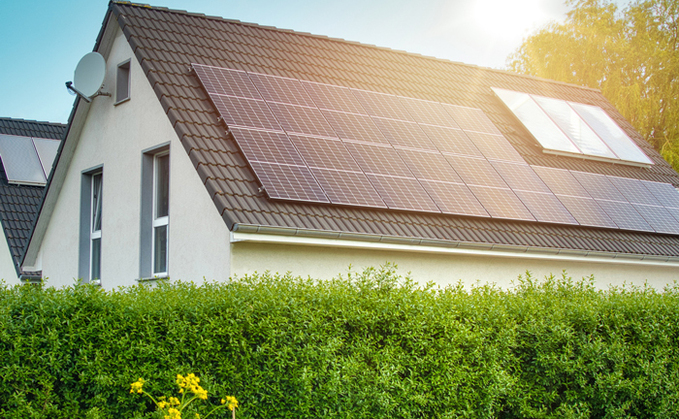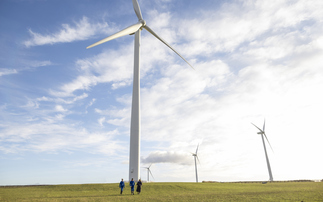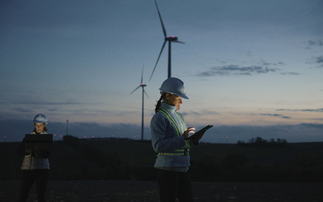
Terry Pratchett's famous economic theory tells us a lot about the urgent need for a net zero transition where the costs and benefits are fairly distributed right across the income scale
In his 1993 novel Men at Arms, the late, great comic writer Terry Pratchett deployed one of his characters to present what was to become a famous economic theory: "A man who could afford fifty dollars had a pair of boots that'd still be keeping his feet dry in ten years' time, while the poor man who could only afford cheap boots would have spent a hundred dollars on boots in the same time and would still have wet feet. This was the Captain Samuel Vimes 'Boots' theory of socioeconomic unfairness."
A similar phenomenon is at risk of undermining the net zero transition. A solar panel theory of socioeconomic unfairness, if you will.
Solar panels and other clean technologies slash energy and fuel bills for households, while minimising exposure to future energy price hikes and air pollution. A recent analysis from the Energy and Climate Intelligence Unit calculated the average household that improved its energy efficiency, installed solar panels and a heat pump, and switched to an EV would enjoy running costs that were nearly £2,000 a year lower than a household with no clean technologies in place. Which is great, but like Pratchett's boots you can only access those savings if you can afford to deploy the technologies in the first place. Meanwhile, poorer households spend thousands of pounds more on their energy bills and are still cold.
To make this unfairness worse still, it is lower income households that are most exposed to the higher food and insurance costs that are resulting from worsening climate impacts, not to mention the inherently regressive short term levies imposed on energy bills to help fund the necessary upfront investment in cleaner energy infrastructure that should curb costs in the long term.
Of course, the costs and benefits associated with solar panels are not quite as simple as Pratchett's expensive boots. When it comes to climate change we really are all in it together. Everyone benefits from improved air quality, reduced fossil gas imports, and lower carbon emissions. But while there are net gains for the economy as a whole, it remains true the financial savings are most immediately apparent for those who can afford to deploy clean technologies relatively early in the transition. Although, just to be absolutely clear, this injustice is no more the fault of the solar panels than it is the fault of Captain Vimes' boots. The problem is policy design and economic inequities, not the product people would like to buy.
Environmental campaigners and clean tech advocates are often reluctant to discuss these issues, on the grounds they are routinely weaponised by climate sceptics and other opponents of the net zero transition. These critics rarely have much in the way of workable policy proposals to help those households on lower incomes, nor anything you could call a track record when it comes to tackling poverty. But that does not stop them from attempting to stoke a backlash against a net zero transition, which they erroneously characterise as an elite concern that offers nothing for poorer households.
As such, a new report this week from the Nuffield Foundation on so-called 'transition poverty' represents an important contribution to a debate that needs to be had.
The report does not call for a dilution of net zero goals, recognising the transition is essential to the UK's long term prosperity and competitiveness. But it does highlight how the way the costs and benefits associated with the transition are shared is a policy choice. And it calculates how the current government's approach risks imposing 'transition poverty' on 40 per cent of households, locking them out of the financial savings and wider economic benefits decarbonisation can offer while leaving them exposed to a disproportionate share of the costs.
There are several important things to note here. Firstly, the problem may be most acute for the poorest households, but it is not limited to them. In much the same way as the cost of living crisis is having a noticeable impact on all but the wealthiest people, millions of middle income households are currently unable to afford the clean technologies that could slash their energy and fuel bills. If this is a problem for 40 per cent of households (and that is likely an underestimate), then it extends far beyond those on the breadline.
Secondly, in fairness to the government, there are various grant schemes and support mechanisms designed to help poorer households undertake energy efficiency improvements and deploy clean technologies that can make their homes warmer and reduce their energy bills. There are lots of case studies of social housing schemes switching to heat pumps and rolling out insulation, for example. Grant schemes are frequently structured to be more generous for those who can least afford to fund home improvements themselves.
But as today's report highlights, these schemes remain few and far between, while others routinely require match funding that is beyond lower income households. There is a long track record of wealthier and older people with more time on their hands being the first to tap into grant and subsidy schemes, such as the Feed-in Tariff incentives that triggered the first solar panel boom, the Plug-in Car Grant Scheme for electric vehicles, or the more recent Boiler Upgrade Scheme. Meanwhile, policies that would benefit poorer households, such as more demanding energy efficiency standards for private rented properties or more funding from general taxation for social housing-targeted energy efficiency programmes, have been shelved or remain badly underpowered.
It is easy to characterise grants for wealthier households as unfair, but there is a legitimate rationale for the government's approach. From the first automobiles to TVs and mobile phones, consumer technologies tend to be embraced first by cash-rich early adopters, before being normalised by the middle classes who drive the economies of scale that force down costs and allow technologies to then become available to all. This is what is already happening with clean technologies, and there is compelling case for government to invest what are extremely modest sums in the grand scheme of things to accelerate the process.
But there is a political risk in an unbalanced policy programme that is perceived to lock poorer households out of the benefits clean technologies can offer, while asking them to contribute to the costs. A political risk that then encourages politicians to delay a transition that will benefit everyone in the long run, leaving those same lower income households most exposed to the volatile fossil fuel prices that triggered the recent energy crisis.
Thankfully, there are plenty of solutions that could help tackle this 'transition poverty'. This week's report highlights the key role citizens assemblies, local authorities, and just transition councils could all play in helping to devise localised policies that ensure lower income households and carbon intensive communities are part of the net zero transition. A higher share of energy efficiency funding should be directed at fuel poor households and public buildings through local authority-led schemes that can help drive down costs. Businesses also have a critical role in creating green jobs and helping employees make the switch to clean technologies through various incentive schemes.
But the primary message is for whoever forms the next government.
Populist parties all around the world are seeking to weaponise net zero policies and blame them, often unfairly, for costs and industrial change that disproportionately impacts those who can least afford it. Public support for bolder climate action remains overwhelming, but it could be quickly eroded if the rewards from the transition are horded by the wealthiest.
The net zero transition promises to benefit everyone through lower energy bills, enhanced energy security, green investment, and massive environmental and health gains. But politicians need to invest time and energy in showing that to be the case. And they need to ensure the transition is enabled through progressive taxation, fair regulation, and a clear plan to ensure clean technologies will quickly be made available for all. As this week's hearing in the High Court attests, it is highly debatable that the current government has such a strategy in place.
A version of this article first appeared as part of BusinessGreen's Overnight Briefing email, which is available to all BusinessGreen Intelligence members.










